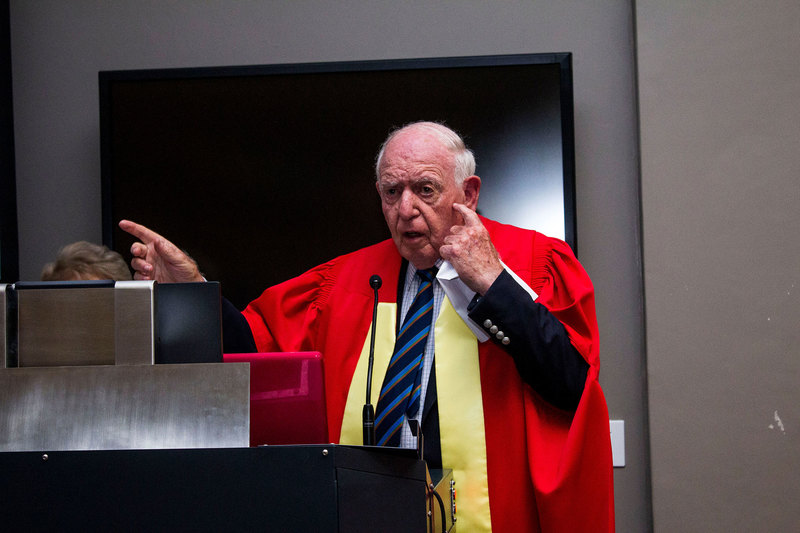The Raymond Ackerman Academy goes national
02 September 2022 | Story Supplied. Photo Raymond Ackerman Foundation. Read time 6 min.
Following 17 years of successfully providing innovative entrepreneurial training to post-matric learners in Cape Town, the Raymond Ackerman Academy of Entrepreneurial Development (RAA) – a partnership between the Raymond Ackerman Foundation and the University of Cape Town Graduate School of Business (UCT GSB) – is going national. The programme will now be extended to entrepreneurs nationwide as it reshapes the format to reach a wider audience.
Launched in 2005 to foster entrepreneurial mindsets, the programme has seen many entrepreneurs graduate and become successful in their respective fields.
Leonora Sauls, the head of Philanthropy at the Ackerman Foundation, said once they graduate their final Cape Town class in September the RAA will move from face-to-face teaching to an online model to provide greater opportunities to those who want to develop their entrepreneurial mindset.
“Over the past two years we have witnessed how technology has enabled a different level of impact.”
“Over the past two years we have witnessed how technology has enabled a different level of impact and we believe that this is the right time to implement the new model into the academy.”
She added, “The Academy at [the] UCT GSB had produced an impressive array of successful entrepreneurs, and it has been wonderful to work with the UCT GSB on this programme that has benefited so many individuals.”
A culture of entrepreneurship
The purpose of the RAA was to develop a culture of entrepreneurship among young people and to provide business management skills to enable young entrepreneurs to establish, grow and sustain a business. The result of this collaboration between the UCT GSB and RAA was a full-time semester course that ran twice a year, for youth between the ages of 18 and 35 years, as well as a year-long business accelerator.
Many RAA graduates have gone on to find meaningful employment, study further or start their own businesses in a variety of industries
The director of the UCT GSB, Dr Catherine Duggan, expressed her thanks to Dr Raymond Ackerman and his family, the founding and sole funders of the programme, for their vision and support during nearly two decades of partnership with the UCT GSB.
“A programme like RAA could empower young people to make a difference in their own lives and the future of their communities.”
“Dr Ackerman and his family were pioneers in recognising that by helping youth to develop not only entrepreneurial skills and business acumen, but also life skills and an entrepreneurial mindset, a programme like RAA could empower young people to make a difference in their own lives and the future of their communities.”
Siphokazi Mngxunyeni, the manager of the RAA programme at the UCT GSB, added: “We have witnessed so many lives changing as young entrepreneurs turn ideas into reality and start to provide for their families.”
Success stories
Some of the success stories include Unathi Zincina, the founder of Umyezo Juicery, who said that her RAA experience is the reason she is still an entrepreneur today. “The classes there were so real and true to life that to this day I still live by some of their teachings, both in business and life in general.”
Gcobisa Maqanda, who currently works as an alumni relations officer at the UCT GSB, said her experience at RAA was life changing. “The highlight of the course was the personal development side. I thought I knew myself, but I soon realised that I was wrong.”
Since completing the RAA, Maqanda has also obtained a PGDip qualification from the UCT GSB.
“The programme ingrained in me the power of collaboration, agility and having an attitude that enables continuous learning.”
Digital marketer Zizipho Dyubheni said that what she is most grateful for are the skills she developed that have informed her growth as a professional and keen entrepreneur. “The programme ingrained in me the power of collaboration, agility and having an attitude that enables continuous learning.”
Nkgetheleng Bocheletsana, who started an early childhood development centre, said that the RAA taught her that there is no easy way to success, and the importance of building a culture, not a company. “The most important lesson I learnt at RAA is that you can’t help everyone, but everyone can help someone to be a better person in life.”
Empower and equip
“Youth in South Africa continue to bear the burden of South Africa’s high unemployment rate,” explained Dr Solange Rosa, the director of the Bertha Centre for Social Innovation and Entrepreneurship at the UCT GSB, who oversaw the RAA. “An entrepreneurial education empowers and equips young people for a successful career, to study further or start their own business and create jobs. This is key in the fight for social equity and justice.”
While the shift from face-to-face activities to online instructions marks the end of a remarkable chapter, Dr Duggan said that the UCT GSB remains committed to the goals of youth empowerment and social change embodied in the RAA programme.
“We are extremely proud of our RAA alumni, and we look forward to identifying new ways to collaborate with them, the Ackerman family and others who are similarly committed to supporting youth and entrepreneurship as a means to broad community development.”
 This work is licensed under a Creative Commons Attribution-NoDerivatives 4.0 International License.
This work is licensed under a Creative Commons Attribution-NoDerivatives 4.0 International License.
Please view the republishing articles page for more information.










